
A Production Production©1998–2025 Dustin Putman

|

 |


Let's cut right to the chase: 2014 was a stupendous year for movies. Not perfect, mind you, but rock-solid. There were a handful of strong mainstream, big-budget blockbusters (e.g., " Godzilla," " The LEGO Movie," " Guardians of the Galaxy," " Captain America: Winter Soldier," " The Amazing Spider-Man 2"), but, as is usually the case, they were overshadowed by the excitingly dynamic work being done within the foreign, documentary and independent arenas. These works took chances and dared to view the worlds and characters created from a unique lens. Time and again, films offered visions never seen before. Daring imagination ran rampant.  Sure, there were still plenty of comic-book adaptations and sequels and remakes and sequel-cum-remakes, but frequently even these pictures were working at a slightly higher level than many viewers were likely anticipating.
I reviewed 181 releases from 2014 (I saw a great deal more than this, but due to a busy schedule was unable to properly write about many of them, like year-end films "Big Eyes," "Cake," "A Most Violent Year," "Unbroken," "American Sniper," among others). This number—a sharp increase from 2013 (181 vs. 158)—led to my seeing 20 truly great films (rating four or three-and-a-half stars) and the lowest number of really, really bad ones (rating one star or less)—just 9—since 2001, a year when my reviewing total was over forty films lower. Also of note: my tally of four-star pictures has risen by one for the last four consecutive years (3 in 2011, 4 in 2012, 5 in 2013, and 6 in 2014), and the highest it has been since 2003, when I saw 7. An encouraging upswing, for sure.
Keeping with my usual year-in-review format, I will begin by highlighting my favorite performances of 2014, followed by my choices for the most overrated and underrated releases, a rundown of 10 great movie moments, and finally my lists for the 10 worst and best features this calendar year had to offer. 2014 went by in a veritable flash, but in between this short January-to-December timeframe there was a lot of pure excellence to go around—cinema that was original and sensitive and unsettling and moving, a rich reassurance to film enthusiasts that this glorious art form is worth still getting excited over. 
(my pick for the absolute best is indicated in red)
Best Actor
Best Actress
Best Supporting Actor
Best Supporting Actress


"Jack and the Cuckoo-Clock Heart," directed by Stephané Berla and Mathias Malzieu, is idiosyncratic bliss, obviously more unconventional than an American-made studio animated release, but also far more curious and compelling. The brainchild of writer-musician Malzieu (he of French rock band Dionysos), this story of a curious and fragile boy who is born with a frozen heart and subsequently saved with a mechanical replacement is a fairy tale of exquisite beauty and gentle, poignant poeticism. The passion and care that is brought to every frame is in immediate evidence, from the snowy vistas of Edinburgh to the dusty, proudly anachronistic snapshots of a pre-20th-century midway. A trip on a dark ride/rollercoaster combo called The Ghost Train, full of supernatural visages, a performing rock band, and a tunnel of creepy bunnies, is a showstopper. Meanwhile, Dionysos' songs will have viewers humming them for days, even weeks, after, while the romantic existential finale is as delicate and provocative as it is emotionally transcendent. Joyous and mournful in equal measure, "Jack and the Cuckoo-Clock Heart" tells of a boy who must learn all too quickly how beautiful yet bitterly temporary everything is in life. This is a special gem of a movie.
"Inherent Vice," directed by Paul Thomas Anderson, originally appeared above as my choice for the most overrated film of 2014. However, if it is important—nay, crucial—for a critic to give his or her honest, balanced, hopefully unbiased opinion on every film reviewed, it is equally imperative that one be able to reassess said works and admit when a personal error or change of heart has been made. This is what has happened with "Inherent Vice," and in a big way. When I first saw the film in early-December 2014, I not only had issues with what I watched, but actively and quite vehemently disliked it. Those feelings can still be read here. While they are no longer relevant, they do represent just how divisive and misunderstood this psychedelic trip through 1970 Los Angeles is, and how uniquely challenging author Thomas Pynchon's narratives can be. A second viewing (and maybe more) is required for the densely written "Inherent Vice," the picture working on so many different levels that it is impossible to take it all in the first time. Many detractors have complained that the plot is incoherent, but it's not; it simply requires that its audience pay attention and be an active participant. Moreover, as sprawling as the story and ensemble are, they are in service of a much more expansive vision built by Pynchon and brought to bold visual life by Anderson—a dreamy, aching, shell-shocked, dope-infused, post-Manson landscape kneeling perilously on the ledge of a new, ever-changing decade. Indeed, the film is not about where the plot goes, but about the kaleidoscopic journey its sincere lead protagonist, private eye Larry "Doc" Sportello (a superb Joaquin Phoenix), takes. A comedy wavering between dark and zany. A seductive film noir that takes Doc's investigation down a labyrinthine array of unexpected paths and blind alleys. A bittersweet romance not only between Doc and the mysteriously beguiling girl who got away, Shasta Fay Hepworth (Katherine Waterston), but with a time, a place and a way of life that would never be quite the same again. It is all here, woven beautifully by Anderson's sure-eyed prowess, cinematographer Robert Elswit's lush, atmospheric, sun-dappled lensing, and an exhilarating soundtrack that pulls it all together. Revisiting the film on Blu-ray was eye-opening, an entirely new experience where everything was the same, yet different. Now, suddenly, I spoke the language, and recognized the restless beauty in what Anderson has captured. Subsequent viewings, no doubt, will only illuminate its place as a deceptively messy but meticulously controlled cinematic wonder, an undervalued gem ripening and enduring with age and perspective, destined for rediscovery.
Underrated Runners-Up: The Amazing Spider-Man 2; Annie; Borgman; Godzilla; In Secret; Lullaby; 300: Rise of an Empire; Starry Eyes; The Town That Dreaded Sundown; Tusk; White Bird in a Blizzard; Walk of Shame; Words and Pictures

(In alphabetical order; please note that this section may contain mild plot-centric spoilers)
In Jennifer Kent's "The Babadook," young Samuel (Noah Wiseman) pulls the wrong bedtime story off his shelf for his mom, Amelia (Essie Davis), to read to him. Pop-up book "Mister Babadook" is about a creature who is decidedly not full of sugar and spice and everything nice, and there will be no happy ending once he has his way with this unsuspecting mother and son.
Single mother Olivia (Patricia Arquette) finds herself devastated as she watches her youngest child, Mason (Ellar Coltrane), prepare to leave for college, in Richard Linklater's "Boyhood." "I just thought there would be more," she tearfully says in a rush of uncontrolled emotion. When we look back on the past stages of our lives that we will never—and can never—get back, isn't this notion always at the heart of what we feel?
In Denis Villeneuve's mind-bending "Enemy," Anthony's (Jake Gyllenhaal) tense get-together with his overly critical mother (Isabella Rossellini) is not by accident proceeded by the disquieting image of a giant, spindly-legged spider hovering over the high-rises of the city skyline, the very world in its clutches.
An idyllic afternoon lunch on the outdoor patio of a French Alps ski resort takes an unexpected turn for a vacationing family when a thought-controlled avalanche comes close to making impact, in Ruben Östlund's "Force Majeure."
In Gareth Edward's "Godzilla," it takes the title lizard nearly an hour to make landfall. When he finally does, on the coast of Honolulu, Hawaii, the long wait proves to be worth it. Indeed, the first full shot of Godzilla is as frightening yet darkly magical as the initial reveal of the T-Rex in "Jurassic Park."
The 14-minute prologue of Rob Marshall's "Into the Woods," based on Stephen Sondheim's 1987 Broadway musical, is less a single moment than a series of moments. Each one, however, is more glorious than the last as Cinderella (Anna Kendrick), Little Red Riding Hood (Lilla Crawford), Jack (Daniel Huddlestone), and the childless Baker (James Corden) and Baker's Wife (Emily Blunt) enter the foreboding title forest, their fairy-tale stories about to converge.
Long-estranged, recently reconnected adult siblings Milo (Bill Hader) and Maggie (Kristen Wiig) bond over an impromptu lip-synching session to Starship's 1980s anthem "Nothing's Gonna Stop Us Now," in Craig Johnson's "The Skeleton Twins." This unforgettable scene avoids becoming cloying and goes straight to that transcendent sweet spot of sheer cinematic joy.
As Kevin Smith's deliciously unusual walrus-centric horror picture "Tusk" approaches its climax, Fleetwood Mac's "Tusk" ingeniously invades the soundtrack while Detective Guy LaPointe (Johnny Depp) and clients Teddy (Haley Joel Osment) and Ally (Genesis Rodriguez) move ever closer to discovering the truth behind podcaster Wallace Bryton's (Justin Long) mysterious disappearance in the Great White North.
An alien (Scarlett Johansson) who has recently landed on Earth makes an aching attempt to be more human when she tries—and fails—to eat a slice of chocolate cake at a roadside diner, in Jonathan Glazer's "Under the Skin."
Can a film that simply isn't very good have a great moment? It can when it is "V/H/S: Viral," a disappointing horror anthology that nonetheless has one outstanding tale of the macabre nestled in the middle. In Nacho Vigalondo's "Parallel Monsters," scientist Alfonso (Gustavo Salmeron) discovers a portal to a mirror-like reality in reverse. Journeying outside, he finds a hellish world that would like a lot like our own were it not for that giant Satanic blimp floating overhead.

 | Noah
"Noah" is an eye-opening study in how even visionary cinematic artists are not immune to getting virtually everything wrong. This Biblical reimagining casts great actors (among them, Russell Crowe, Jennifer Connelly, Anthony Hopkins and Emma Watson) and then makes a mockery of the passionate work they put into it. Darren Aronofsky can be a fine director, and sometimes more than that, but his work here is gaudy yet bereft of wonder, self-serious but sorely lacking in complexity or plausibility (even by the standards of an out-there fantasy). Full of ill-advised rock monsters, uneven special effects, and a lead protagonist who is an insufferable megalomaniac, Aronofsky turns an already-far-fetched story into an even sillier, threadbare bit of nonsense. In terms of money spent and talent procured, this is a major creative fiasco in the annals of big-screen turkeys. |
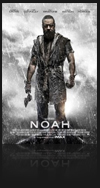 |
 | Alien Abduction
Dating back to as early as 1913, Brown Mountain, North Carolina, has been the location for sightings of unexplained ghost lights in the skies—a phenomenon that has come to be known as "The Brown Mountain Lights." This is prime real estate for a sci-fi/horror tale exploring the subject, one that might peer seriously into the real-life mystery while using it as the jumping-off point for something really, really scary. "Alien Abduction" isn't that film by a long shot. Instead, debuting director Matt Beckerman has chosen to mount a found-footage knock-off of "The Blair Witch Project" that grows more shameless by the minute. Yes, there is even a tearful, snotty-nosed confession in front of a camcorder. Compromised by subpar acting, dishonest editing that belies its first-person auspice, musical stingers and instrumental scoring that ring entirely false, and the most unconvincing cinematic portrayal of autism in memory, this was one abduction to which it was not worth paying attention. |
 |
 | That Awkward Moment
A lewd, often crude romantic comedy about sex and relationships amongst a group of best friends in Manhattan, "That Awkward Moment" was described in early press reports as the male equivalent of "Sex and the City." This is an inaccurate and, for that acclaimed Michael Patrick King series, mildly insulting comparison. Carrie Bradshaw and pals might have been learning about the joys, heartaches and frequent intricacies of love as they went along, but they still were smart ladies with thoughts, ideas and sympathetic viewpoints. The emotionally stunted guys here have nothing of substance to talk about and only the minimum number of brain cells necessary to physically function in the world. The film they are in—the dismal writing-directing debut of Tom Gormican—is equally moronic, a disingenuous 94-minute eye-roller that wastes a hot cast featuring Zac Efron, Michael B. Jordan and Miles Teller. Puerile and insulting, "That Awkward Moment" has been made for no one in mind besides adult males who are permanently stranded at the maturity level of 15-year-olds. |
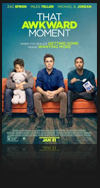 |
 | I, Frankenstein
Mary Shelley, this is not. Based on the Darkstorm Studios graphic novel by Kevin Grevioux and headlined by a pained Aaron Eckhart, the $65-million made-by-committee "I, Frankenstein" is so vacant of its own identity that it could just as easily be a loose remake of "Underworld," "Van Helsing," "Max Payne," "Season of the Witch" or "Priest." Although Stuart Beattie is credited as the writer-director of the piece, the artificial, developmentally challenged, CGI-reliant final product reeks of studio interference by a collective of clueless behind-the-curtain bigwigs who don't give a damn about creative expression and haven't a clue what a good film makes as long as they deliver what they (incorrectly) believe will satisfy the financial bottom line. It isn't a surprise that "I, Frankenstein" precariously dangles by a thread of vague coherence throughout, nor that the film was delayed by Lionsgate for eleven months only to finally show its stitched-together face in the frosty cinematic landscape of January. Indeed, it's as tragically soulless as its inhuman lead character. |
 |
 | The Legend of Hercules
The first of two terrible 2014 movies about Hercules, "The Legend of Hercules" is bumbling tripe, the rooting interest it works up in the viewer accurately equating to the makers' interest in staying true to the classic mythology upon which the story is based. Directed by Renny Harlin, this trifling, poorly staged, cliché-heavy action-adventure hasn't a scene that isn't dopey and strictly by-the-numbers, just as there is scarcely a scene that doesn't resemble what one would expect from a "Medieval Times" dinner theater. The actors, led by a constantly shirtless Kellan Lutz, are at the mercy of some head-scratchingly terrible dialogue that makes them sound like they're speaking Shakespeare by way of "The Real Housewives of Beverly Hills." There have been boxes of hair smarter than this movie. |
 |
 | Hercules
Six and a half months after Renny Harlin's "The Legend of Hercules" stunk up multiplexes with its clunky, IQ-deficient ineptness, another loose big-screen treatment of the half-man/half-God warrior arrived in the form of "Hercules," unimaginatively directed by Brett Ratner and starring a sorely squandered Dwayne Johnson. With little interest in genuinely exploring the character as a person or a mythological figure—the source material is a revisionist Radical Comics graphic novel by Steve Moore—Ratner made a dreary, trivial, antiseptic $100-million throwaway with absolutely no dramatic pull until the final ten minutes. With the film winding down just when it has located a last-gasp charge of energy, what, then, is the point? Too serious to work as farce and too campy to be taken seriously, the picture's tonal confusion all but cancels the entire experience out. "Hercules" is overpriced, distinctly unsatisfying Hollywood schlock without a trace of bite. |
 |
 | RoboCop
Director José Padilha's $100-million reboot of Paul Verhoeven's smartly satirical, wholly uncompromising 1987 vigilante thriller, "RoboCop," was an evisceration more than a remake. Doing away with everything that made the original so special, Padilha's work is glumly self-serious, harmfully sanitized to a PG-13 rating, and absent of any detectable personality at all. It is also, while we're on a list-making roll, dramatically moribund and intensely disposable, its identity that of yet another colorless, bloated cash-in based on an established, potentially nostalgic franchise property. Forget the mechanized title figure played by Joel Kinnaman; every character in front of the camera is so stodgily one-note and lifeless they might as well all be robots. The late, great Roger Ebert once wisely opined, "All bad movies are depressing, and no good movies are." "RoboCop" is really, really depressing. |
 |
 | A Haunted House 2
Brutally unfunny and altogether ignorant, ghost-movie spoof "A Haunted House 2" was nothing if not consistent with 2013's "A Haunted House." In putting on a hasty sequel, returning director Michael Tiddes and writers Marlon Wayans and Rick Alvarez are of the mind that if their formula isn't broke, there's no need to fix it. The trouble is that just about everything was broken the first time around. This is neither a wittily conceived farce nor a parody smart in its dumbness. Begrudgingly, it becomes plainly apparent after only a few minutes that the filmmakers are once more happy to reach for the lowest common denominator, slapping together an icky non-stop barrage of bodily functions, racial stereotyping and rancid epithets and calling it a comedy. |
 |
 | ABCs of Death 2
2013's "The ABCs of Death" was hit-or-miss in the extreme, a horror anthology consisting of 26 short films from 26 directors, each one representing a different letter of the alphabet. The formula remains the same but the already-chancy quality goes straight down the tubes in the appallingly bad "ABCs of Death 2." It is stunning to think that two bakers' dozen worth of filmmakers (many of them established talents such as Rodney Ascher of 2012's "Room 237", Vincenzo Natali of 2010's "Splice," and Jen and Sylvia Soska of 2013's "American Mary") were given free rein to do whatever they wanted, and yet not a single one achieves anything approaching genuine fright. This cavalcade of sophomoric, mean-spirited, rampantly sexist schlock is an embarrassment, putting to shame all of the exciting, limitless possibilities the horror genre has to offer. |
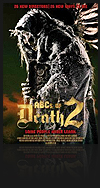 |
 | America: Imagine the World Without Her
A heinously inflammatory propaganda piece that gives the documentary form and even-minded conservatives bad names, "America: Imagine the World Without Her" boils down to 105 minutes of uneducated ignorance. Right-wing author-commentator Dinesh D'Souza writes and directs alongside John Sullivan, but it is D'Souza who is front and center, narrating the film and creepily prowling through shots of D.C. and NYC landmarks—the White House, the Lincoln Memorial, Times Square—looking less like a pensive scholar and more like he's going to pull out explosives from his jacket at any minute. Their historical and political representation of America is painfully one-sided, yes, but also about as convincing and refined as a second-grader's outlook on these topics. Everything is black and white, while facts are twisted into myths to better suit their needs. In heartlessly, unconscionably refuting the country's past and reshifting the blame for all that occurred, "America: Imagine the World Without Her" is about as far away from a pro-American declaration as one could envision. The bitter taste it leaves in one's mouth is indefensible. |
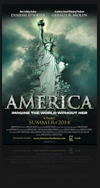 |

 | Birdman or (The Unexpected Virtue of Ignorance)
A volcanic meditation on the nature of fame, the realities of aging and the drive to remain relevant, "Birdman or (The Unexpected Virtue of Ignorance)" is an astonishing technical achievement as well as a cutting behind-the-scenes exploration of a stage play in process. In what is arguably the greatest film role he has ever received, Michael Keaton stars as 60-year-old Hollywood actor Riggan Thomson. In a last-ditch effort to reclaim the success he once had with superhero franchise "Birdman," he is preparing to write, direct, finance and star in a Broadway adaptation of Raymond Carver's "What We Talk About When We Talk About Love." Once the show opens, though, will anyone care? Writer-director Alejandro González Iñárritu has imagined this project—at once thematically sprawling and geographically intimate—as a spectacularly complex magic trick wherein there does not appear to be a single cut until very, very late into the 119-minute running time. Acidic yet empathetic, "Birdman or (The Unexpected Virtue of Ignorance)" rattles and provokes its viewers as more than a rather brilliant technical exercise. It is an experience of subtextual substance, of deep emotion, of cutting dark humor, of magical realism that may or may not exist in the mind of an actor ready to do whatever it takes to be celebrated. Destined to be voraciously talked about and studied for years to come, the picture is, perhaps, imperfect, but it is also unmistakably great. |
 |
 | Foxcatcher
"Foxcatcher" is one brushstroke of creative licensing away from becoming a horror film—and, in many way, this sordid true-life tale of jealousy, obsession and probable madness already is. The picture, directed by Bennett Miller and co-written by Dan Futterman and E. Max Frye, is intoxicatingly sad, a psychological study of two men whose crossed paths irrevocably altered more lives than just their own. In one corner is down-on-his-luck wrestler Mark Schultz (Channing Tatum), a 1984 Olympic gold medalist who, three years later, is looking to reclaim the victories of his past. In the other corner is author-explorer-ornithologist-philatelist-philanthropist-coach John E. du Pont (Steve Carell), heir to the largest chemical corporation in the world, who has built a multimillion-dollar wrestling facility on the property of his family's storied Pennsylvania estate. Schultz accepts du Pont's offer to come train with him, but where this relationship—and the one between du Pont and Schultz's older brother, Dave (Mark Ruffalo)—led, no one saw coming. Tantalizing and disturbing in equal measure, "Foxcatcher" is a firecracker of a thriller about a perfect storm of events that led to an inexplicable tragedy. As the broken, unhappy, enigmatic du Pont, a virtually unrecognizable Steve Carell is nothing short of revelatory. |
 |
 | The Babadook
"If it's in a word or it's in a look, you can't get rid of the Babadook." When a horror picture is perceptive and specific enough in character and story, it holds the power to remain wholly involving even if it were to be stripped of the very elements that distinctly make it a work of said genre. If a filmmaker can achieve this, his or her job is practically complete. Such is the case with Aussie writer-director Jennifer Kent and her mesmerizing, disquieting, unexpected debut feature, "The Babadook," a film that, like 1973's "The Exorcist," seems to have arrived fully formed as an instant classic. Kent has devised a teeth-chattering, armrest-clenching premise about a monstrous pop-up storybook invading the lives of a widowed mother (Essie Davis, phenomenal) and her troubled 7-year-old son (the astonishingly natural Noah Wiseman), and then shaped it into something altogether deeper, a surprising, devastating metaphor for the difficulty of loss, the struggles of parenthood, and a key something else best not to be revealed. Urgent yet compassionate, unyielding as well as frostily whimsical, the film transforms again and again as it cackles in the face of expectations. |
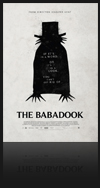 |
 | Still Alice
"Still Alice" portrays with consummate dignity the harrowing effects of an undignified disease. More than that, it is the unshakably forthright story of an able-bodied, thought-flourishing woman who learns she will one day, very soon, no longer know who she or her loved ones are. Beautifully written and directed by Richard Glatzer and Wash Westmoreland, adapting from Lisa Genova's best-selling novel, the film's unsuspecting page-turner quality derives from its unforced, piercingly true observations rather than contrived gimmicks or plot points. This is no sudsy disease-of-the-week melodrama, either, but an uncompromising slice-of-life that sees Alice (Julianne Moore)—and the life she has built and stands to lose—as so much more than a woman with Alzheimer's. The results are ceaselessly absorbing and uniquely haunting, shepherded by what could quite possibly be a career-best performance from Moore—no small claim for an actor who consistently works at the top of her game. Watching her in this role provides a thrill that not even some of the best action films could hope to attain. |
 |
 | Borgman
A scathing deconstruction of class status, familial dysfunction and the evilness which man is capable, "Borgman" unveils a portrait of the world as wincingly pessimistic as it is unnervingly accurate. Dutch filmmaker Alex van Warmerdam's hypnagogic, barrier-toppling chiller of human dysphoria and dismantled social mores exists on a plane straddling reality and semi-surreal metaphoric mysticism, one that twists a knife squarely into common conformity. If the picture falls into what could best be described as the home-invasion subgenre, such categorization seems far too quaint and marginalizing for something so uniquely, hair-raisingly inventive. Is the title figure a devil, a savior or simply a psychopathic cult leader with a strange orange elixir and a bevy of surgical scalpels among his arsenal? Is the film horror, or fantasy, or one of the grimmest satires that has ever been concocted about class warfare and the convulsive state of the nuclear family? To watch the boundlessly unpredictable "Borgman" unpeel one disquieting layer at a time is to be simultaneously invigorated, terrified and humbled by the vastness of its macabre ambition. |
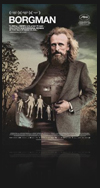 |
 | Enemy
"Chaos is order yet undeciphered," reads the opening title card of "Enemy," Denis Villeneuve's bravely imaginative, startlingly unsettling, freakily mesmerizing puzzle-box mindbender. A Freudian study of waking nightmares, hidden desires, and the despair of losing one's identity, the film—based on the novel "The Double" by Nobel Prize-winning author José Saramago—is the kind of infinitely layered cinematic miracle that deserves to be pored over, obsessed about and studied for years to come. As entrancing as the premise is on its own—Jake Gyllenhaal stars as college professor Adam Bell, who puts on a movie and spots his physical dead ringer, an actor named Anthony, on the screen—it's what is revealed the longer one watches and contemplates that transforms the picture into something altogether larger and more hauntingly evocative. With shuddering, insatiably surrealism, "Enemy" fascinatingly delves into the psychology of a human being faced with the internal crisis of having a doppelgänger and the question of what makes him or anyone else unique. Indeed, the deeper Adam and Anthony dare to venture into one another's personal environments and plagued psyches, the more shrewdly sinister the film's imposing allusions become. |
 |
 | Life Itself
In the remarkable documentary "Life Itself," a compendium to late Chicago Sun-Times film critic Roger Ebert's 2012 memoir, director Steve James gets to the heart of precisely what its title infers. Acting as a celebration and eulogy of a person who lived fallibly, bravely and—most important—fully, the film flawlessly, heartbreakingly captures the transcendence of one's ever fleeting existence. James began filming five months before Roger's passing with the critic's full support. Left without a jaw following surgeries related to thyroid and salivary gland cancer, he exhibits no vanity in front of the camera, insisting to the filmmaker that he wanted the picture to, above all else, show reality. Through home video footage, photographs and sometimes moving, other times funny interviews with the friends, family and acquaintances who knew him best, Roger Ebert is brought back to life for two sweeping, stunning, magical hours. Ebert had said many times that he was not afraid to die, that it was something that everyone eventually must go through, and wife Chaz's recount of his final moments are crushing, honest and indescribably beautiful. James has not made a film about a perfect man or a martyr. Instead, he has created an authentic, impassioned, wholly formed, emotionally sublime tribute to someone who was human in his flaws, who was generous with his time, who lent support to aspiring filmmakers, who took advantage of the gifts inside himself and turned them into art. He may no longer be here, but his impact and legacy will endure. For someone who loved movies as much as he did, Roger Ebert would be pleased to find that "Life Itself" is one of the year's very best. |
 |
 | Force Majeure
For Swedish couple Tomas (Johannes Bah Kuhnke) and Ebba (Lisa Loven Kongsli) and their children, Vera (Clara Wettergren) and Harry (Vincent Wettergren), a relaxing, picturesque vacation at a ski resort in the French Alps instantly transforms into something far more contemplative and unsettling when they face what they initially believe to be a near-death experience. In a hasty moment of fight-or-flight panic, Tomas flees, leaving the rest of his family behind to fend for themselves. The avalanche appearing to be headed straight for them is a false alarm, but by this time the damage has been done. With all of the untainted resplendence of a travelogue and all of the cathartic emotional signification of human drama both high-powered and intimate, "Force Majeure" is an unsuspecting cinematic spectacle. Writer-director Ruben Östlund has crafted a dream for the senses, revelatory in its audacious examination of a provocative hot-button subject that has never before, in quite the same way, been broached in a feature film. It is mature and perceptive and deeply moving, but its sly, razor-edged comedic bent is simultaneously on point, brilliantly blurring the lines between painful and painfully droll. Every image radiates with glacial beauty and virtuosic metaphoric symbolism. As all great art should, the film is destined to provoke serious discussions and passionate debates among viewers. "Force Majeure" is a blistering, ultimately empathetic tour de force. |
 |
 | Boyhood
Time is a funny thing. It sneaks up on us when we're not paying attention, and keeps on ticking even when we do. As young children and adolescents, we aren't yet old enough to consider the bigger picture of how precious and sad and sometimes scary and other times joyous and entirely fleeting our very youth is. As adults with imbued perspective and a bevy of additional experiences under our belts, we are more conscious of the process of life, yet still, year after year, cannot quite believe how quickly it passes us by. "Boyhood" is about all of this and, basically, everything. Chronologically shooting for thirty-nine days over an unheard-of span of twelve years, writer-director Richard Linklater charts with stunning, uncanny verisimilitude the growth of a little boy of six who transforms over the course of a breathtaking 166 minutes into an 18-year-old man. This by itself is startlingly powerful and joltingly cathartic, yet it is Linklater's and his brilliant actors' (Ellar Coltrane, Ethan Hawke, Lorelai Linklater, and an especially stunning Patricia Arquette) handling of their all-encompassing material that lifts the film to a level which delves far deeper and becomes more significant than what viewers will be anticipating. It is nothing short of stunning to watch "Boyhood" unfold, a seamless, expansive assemblage of human experiences and memories not merely the story of a boy coming of age, but an encapsulation of what it is like to be a sibling, a parent, a teenager and a grown-up. When the film comes to its wistful, wonderful, note-perfect conclusion, the experience of having watched these people onscreen has become the experience of watching the tale of our own lives. |
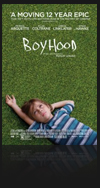 |
 | Under the Skin
Sometimes, when a motion picture is so extraordinarily transcendent that it single-handedly redefines the auspicious capabilities of the filmic form, the English language—or, really, any language—seems almost too quaint to do its achievements justice. Written and directed by Jonathan Glazer with an auteur's eye for the hauntingly wondrous and sublime, "Under the Skin" astonishes and provokes from frame one, pitch darkness giving way to a pinhole of illumination that moves ever closer to the camera before finally casting a nakedly exposing light onto the audience. In this moment, much like the big bang itself, a strange and strikingly elusive young woman (Scarlett Johansson) is born anew. The world she steps foot onto is Earth, and more specifically the rocky, untamed Scottish Highlands, but in many respects the surroundings appear to the viewer as mesmerizingly, ominously alien as they are to her. What she does next, and where her ultimate terrifying fate and circumstances lead her, will confound, exhilarate, challenge, and cumulatively devastate. In a sensory experience of rugged force and thorn-prick beauty, the film continuously outdoes itself. Against the backdrop of her remote environment's untarnished natural majesty, Johansson's veiled feminine creature does all that she can to fulfill her greater mission before losing her way like the meek star of her own ghastly fairy tale. When the bitter end of the line comes, the tranquility of the fresh-falling snow will only act as a temporary blanket to the harrowing secrets—one from this world, one from another—lurking underneath. In the picture's final minutes, she does, at last, find common ground with humanity in her shattering fallibility. To watch the astounding "Under the Skin" unfold is to lay witness to no less than the next enduring milestone in cinema's ever-evolving legacy. |
 |
|
© 2014 by Dustin Putman
 |
|
|
|